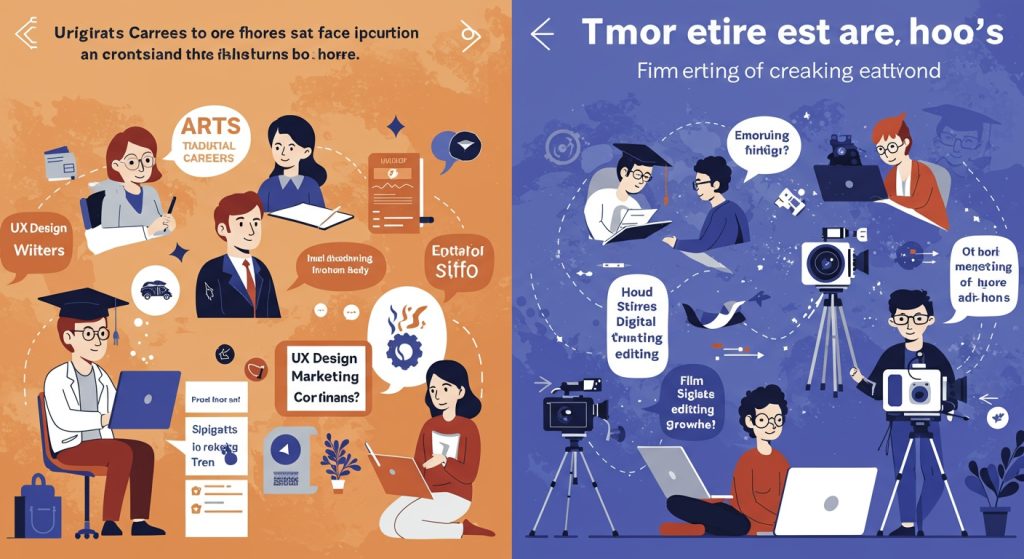Feeling the pressure to become a doctor or engineer after your 12th exams? It’s time to rethink those limited options. The modern job market is exploding with opportunities far beyond the traditional pathways. We’ll explore exciting fields like Data Science, fuelled by the surging demand for AI, where analytical skills translate into impactful solutions. Consider the booming field of UX/UI Design, crafting user-centric digital experiences for the ever-expanding digital world. Or maybe ethical hacking and cybersecurity, protecting our digital infrastructure from increasingly sophisticated threats, is more your speed. We’ll uncover these and other surprising career paths, equipping you with the knowledge to make an informed choice about your future.

Decoding the Myth: Career Avenues Beyond the Traditional
For generations, the narrative post-12th grade has often been narrowly focused: medicine or engineering. While these are undoubtedly valuable and rewarding paths, the modern world offers a kaleidoscope of opportunities that leverage diverse talents and interests. This section aims to debunk the myth that success is solely defined by these two professions and open your eyes to a broader horizon of possibilities.
The Allure of Design: Shaping the Visual World
Design, in its various forms, is a powerful and influential field. From the clothes we wear to the websites we browse, design shapes our experiences and perceptions. Here’s a glimpse into some exciting design-related careers:
- Fashion Design: If you have a flair for style and a passion for creating clothing, fashion design could be your calling. You’ll learn about textiles, pattern making. The entire fashion design process. Real-world examples include working for established fashion houses, launching your own brand, or becoming a stylist for celebrities.
- Graphic Design: Visual communication is key in today’s world. Graphic designers create logos, websites, marketing materials. More. Key skills include proficiency in design software like Adobe Photoshop, Illustrator. InDesign. Many graphic designers work freelance or for marketing agencies.
- Interior Design: Transforming spaces into functional and aesthetically pleasing environments is the core of interior design. You’ll learn about space planning, color theory. Furniture selection. Interior designers can work on residential projects, commercial spaces, or even set design for films and television.
- User Interface (UI) and User Experience (UX) Design: In the digital realm, UI/UX designers focus on creating intuitive and engaging digital experiences. UI focuses on the visual aspects of a website or app, while UX focuses on the overall user experience and usability. These roles are highly sought after in the tech industry.
The Power of Words: Careers in Communication and Media
If you have a knack for writing, storytelling, or communication, a career in media and communication could be a perfect fit.
- Journalism: Investigative reporting, news writing. Feature writing are all aspects of journalism. With the rise of digital media, journalists are needed to create content for online platforms, newspapers. Television.
- Public Relations (PR): Shaping public perception and managing a company’s image is the role of a PR professional. Skills in communication, writing. Media relations are essential.
- Advertising: Creating compelling campaigns that resonate with target audiences is the goal of advertising professionals. Roles include copywriting, art direction. Media planning.
- Digital Marketing: In the digital age, understanding online marketing strategies is crucial. Digital marketers manage social media campaigns, search engine optimization (SEO). Email marketing. This is a rapidly growing field with high demand.
- Content Creation: Creating engaging and informative content for various platforms is the core of content creation. This can include writing blog posts, creating videos, or producing podcasts. Many content creators work independently or for marketing agencies.
The Business World: Beyond the Bottom Line
A career in business offers diverse opportunities for analytical minds and strategic thinkers.
- Business Administration: A degree in business administration provides a broad understanding of business principles, including finance, marketing. Management. This can lead to roles in various industries and departments.
- Finance: Managing money, investments. Financial risk is the core of finance. Roles include financial analyst, investment banker. Financial advisor.
- Marketing: Understanding consumer behavior and developing marketing strategies is the focus of marketing professionals. Roles include market research analyst, brand manager. Digital marketing specialist.
- Human Resources (HR): Managing employees, recruitment. Employee relations is the role of HR professionals. Strong interpersonal and communication skills are essential.
- Entrepreneurship: Starting your own business requires a combination of skills, including business planning, marketing. Financial management. While challenging, entrepreneurship offers the potential for significant rewards and independence.
The Tech Landscape: Innovation and Opportunities
The technology sector is booming, offering a wide range of career opportunities for those with a passion for innovation.
- Data Science: Analyzing large datasets to extract insights and inform decision-making is the core of data science. Key skills include programming (Python, R), statistics. Machine learning.
- Cybersecurity: Protecting computer systems and networks from cyber threats is the role of cybersecurity professionals. This is a rapidly growing field with high demand.
- Web Development: Creating websites and web applications is the focus of web developers. Skills include HTML, CSS, JavaScript. Various programming languages.
- Game Development: Designing and developing video games requires a combination of technical and creative skills. Roles include game designer, programmer. Artist.
- Artificial Intelligence (AI) and Machine Learning (ML): Developing intelligent systems that can learn and adapt is the focus of AI/ML engineers. This is a cutting-edge field with enormous potential.
The Performing Arts: Expression and Creativity
For those with a passion for performance and creativity, the performing arts offer a fulfilling career path.
- Acting: Performing on stage, in film, or on television requires dedication, training. Talent. Acting schools and workshops can help develop the necessary skills.
- Music: Playing an instrument, singing, or composing music can lead to a career as a musician. Opportunities exist in orchestras, bands. As solo performers.
- Dance: Performing various dance styles requires years of training and dedication. Dancers can work in ballet companies, modern dance troupes, or as choreographers.
- Film and Television Production: Behind the scenes, various roles are essential for creating films and television shows, including directing, producing, cinematography. Editing.
The Hospitality and Tourism Industry: A World of Experiences
If you enjoy working with people and providing exceptional experiences, the hospitality and tourism industry offers a rewarding career path.
- Hotel Management: Overseeing the operations of a hotel, including guest services, food and beverage. Housekeeping, is the role of a hotel manager.
- Event Management: Planning and executing events, such as weddings, conferences. Festivals, requires strong organizational and communication skills.
- Tourism Management: Promoting and managing tourism destinations requires an understanding of marketing, cultural heritage. Sustainability.
- Culinary Arts: Creating delicious and visually appealing food is the focus of culinary arts. Chefs can work in restaurants, hotels, or as personal chefs.
The Liberal Arts: A Foundation for Success
A liberal arts education provides a broad foundation of knowledge and skills that can be applied to various careers.
- Psychology: Understanding human behavior and mental processes is the focus of psychology. Career paths include clinical psychology, counseling. Research.
- Sociology: Studying society and social interactions can lead to careers in social work, community development. Research.
- Political Science: Understanding political systems and processes can lead to careers in government, policy analysis. Journalism.
- Economics: Analyzing economic data and trends can lead to careers in finance, consulting. Government.
Career Guidance: Navigating Your Options
Choosing a career path can be daunting. There are resources available to help you make informed decisions. Career Guidance counselors can provide personalized guidance based on your interests, skills. Values. They can also help you explore different career options and develop a plan for achieving your goals. Online career assessments can also provide valuable insights into your strengths and potential career paths.
Making the Right Choice: Factors to Consider
When choosing a career path, consider your interests, skills, values. Personality. What are you passionate about? What are you good at? What is vital to you in a job? Research different career options and talk to people who work in those fields. Consider internships or volunteer opportunities to gain experience and explore your interests. Ultimately, the best career path is the one that aligns with your individual goals and aspirations.
Conclusion
Let’s consider this an implementation guide to your future. You’ve now seen that beyond the well-trodden paths of engineering and medicine lies a diverse landscape of exciting career options. Remember, identifying your passion is only half the battle; the other half is taking actionable steps. Start by researching specific programs and institutions that align with your newfound interests. Don’t just browse; reach out to professionals in those fields, perhaps through LinkedIn. Ask for informational interviews. Consider short-term courses or internships to test the waters before committing to a full degree. For example, if you’re intrigued by data science, explore online coding bootcamps or volunteer to assess data for a local non-profit. Success here isn’t solely about landing the highest-paying job; it’s about finding a career that fuels your intellectual curiosity and contributes to a fulfilling life. Track your progress, celebrate small wins. Remember that every step, no matter how small, brings you closer to your ideal career. The Bureau of Labor Statistics is a great resource for further exploration.
More Articles
Top Computer Science Courses for AI and Machine Learning in 2025
Essential Earth Science Courses: Shaping Sustainability Careers for 2025
Mastering Material Science: The Top 5 Courses for Nanotechnology Focus
Top 5 Computer Science Courses for Cybersecurity Professionals in 2025
Best Material Science Courses: Focus on Sustainable Material Development for 2025
FAQs
Okay, so I’m not feeling the whole doctor or engineer vibe. What ELSE is even out there after 12th?
Dude, so much! Seriously, beyond the usual suspects, you’ve got a ton of options. Think about creative fields like design (fashion, graphic, UX), media and journalism, hospitality and tourism, or even something super specialized like data science or cybersecurity. The world’s your oyster, really!
Design sounds cool. Is it actually a stable career? My parents are kinda worried about ‘job security’.
That’s a valid concern! While ‘stable’ can mean different things, design is definitely in demand. Every company needs a website, branding. A user-friendly interface. Plus, you can freelance or work for a big corporation. Building a strong portfolio and staying updated with trends is key to staying competitive though.
What if I’m more into, like, understanding people and cultures? Any options there?
Absolutely! Consider fields like sociology, anthropology, psychology, or even international relations. These can lead to careers in research, social work, human resources, diplomacy, or even market research. You’ll be digging into what makes people tick and how societies function – pretty fascinating stuff!
I’m decent at writing… Could I actually make a living doing that?
Definitely! Content creation is HUGE right now. Think copywriting, journalism, blogging, technical writing, scriptwriting… The possibilities are pretty broad. Build a portfolio, hone your skills. Network like crazy. The digital world needs words. Good writers are always in demand.
Cybersecurity keeps popping up. Is that something only super-geniuses can do?
Not at all! While it’s definitely a technical field, you don’t need to be coding since birth. There are cybersecurity programs that teach you the fundamentals. It’s a growing field with a massive skills gap, so if you’re analytical, detail-oriented. Enjoy problem-solving, it’s worth exploring.
Okay, this is helpful! But how do I even figure out what I’m actually good at and enjoy?
Great question! Start by exploring your interests. Take online quizzes, try out different courses, shadow professionals in fields that pique your curiosity. Most importantly, don’t be afraid to experiment. Internships are gold! Also, talk to people in different careers – you’ll be surprised at what you learn.
What about the money? Are these ‘alternative’ careers actually going to pay the bills?
That depends entirely on the field, your skills. Your experience! Some are definitely more lucrative than others right off the bat. Do your research on average salaries, potential for growth. The skills needed to climb the ladder. Passion is crucial. You also gotta be practical!



